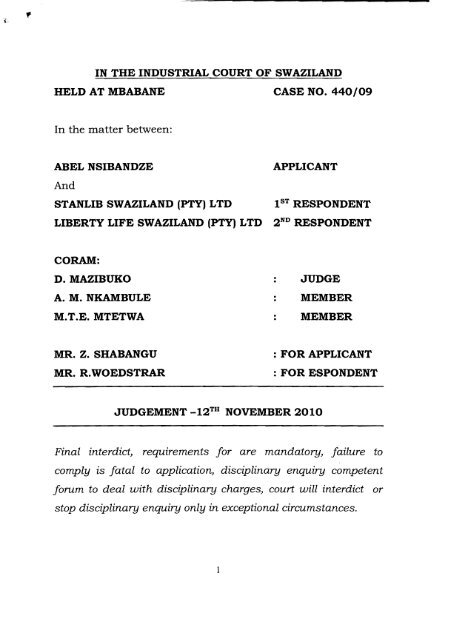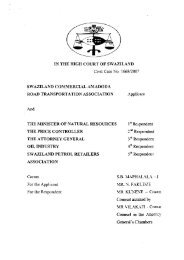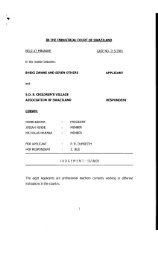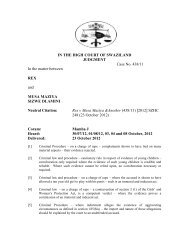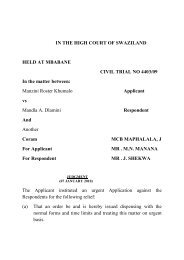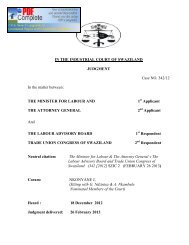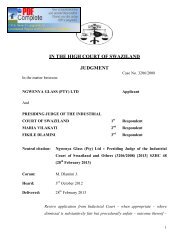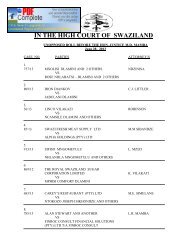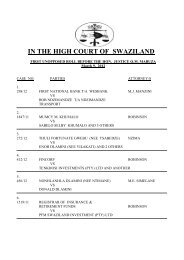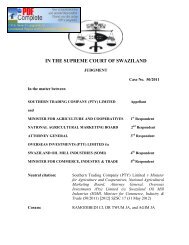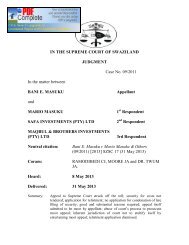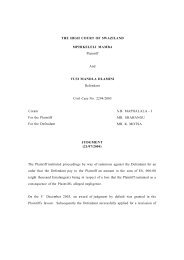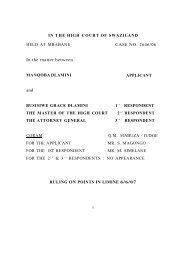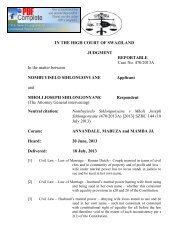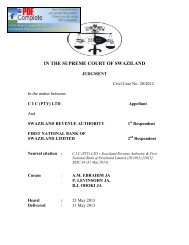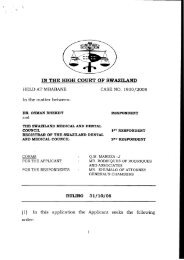Final interdict, requirements for are mandatory, failure to ... - SwaziLII
Final interdict, requirements for are mandatory, failure to ... - SwaziLII
Final interdict, requirements for are mandatory, failure to ... - SwaziLII
Create successful ePaper yourself
Turn your PDF publications into a flip-book with our unique Google optimized e-Paper software.
IN THE INDUSTRIAL COURT OF SWAZILAND<br />
HELD AT MBABANE CASE NO. 440/09<br />
In the matter between:<br />
ABEL NSIBANDZE APPLICANT<br />
And<br />
STANLIB SWAZILAND (PTY) LTD 1 sT RESPONDENT<br />
LIBERTY LIFE SWAZILAND (PTY) LTD 2ND RESPONDENT<br />
CORAM:<br />
D. MAZIBUKO<br />
A. M. NKAMBULE<br />
M.T.E. MTETWA<br />
MR. Z. SHABANGU<br />
MR. R.WOEDSTRAR<br />
•<br />
JUDGE<br />
JUDGEMENT _12TH NOVEMBER 2010<br />
MEMBER<br />
MEMBER<br />
: FOR APPLICANT<br />
: FOR ESPONDENT<br />
<strong>Final</strong> <strong>interdict</strong>, <strong>requirements</strong> <strong>for</strong> <strong>are</strong> <strong>manda<strong>to</strong>ry</strong>, <strong>failure</strong> <strong>to</strong><br />
comply is fatal <strong>to</strong> application, disciplinary enquiry competent<br />
<strong>for</strong>um <strong>to</strong> deal with disciplinary charges, court will <strong>interdict</strong> or<br />
s<strong>to</strong>p disciplinary enquiry only in exceptional circumstances.<br />
1
1. The Applicant, Mr Abel Nsibandze is employed as a<br />
coun try managing direc<strong>to</strong>r by the 1 st and the 2 nd<br />
Respondents.<br />
2. The 1 st Respondent, Stanlib Swaziland (Pty) Ltd is a<br />
company registered in Swaziland trading as Stanlib. The<br />
2 nd Respondent, Liberty Life Swaziland (Pty) Ltd is a<br />
company registered in Swaziland trading as Liberty Life.<br />
3. The Applicant has alleged in his founding affidavit that<br />
he was first employed by the 1 st Respondent in March<br />
2006 as a general manager. About February 2007 the 1 st<br />
Respondent was incorporated in<strong>to</strong> Liberty Group of<br />
companies (2 nd Respondent). The Applicant continued <strong>to</strong><br />
work as a general manager. About November 2007 the<br />
Applicant was promoted <strong>to</strong> country managing direc<strong>to</strong>r.<br />
The parties <strong>are</strong> in agreement that the Applicant works<br />
<strong>for</strong> both the 1 st and the 2 nd Respondents as a country<br />
managing direc<strong>to</strong>r based in Swaziland hence the joinder<br />
of the two (2) Respondents.<br />
4. The Applicant has approached the court by way of an<br />
urgent application <strong>for</strong> relief as follows;<br />
2
..<br />
(1) Dispensing with the normal provisions of the Rules<br />
of this Honourable Court as relate <strong>to</strong> <strong>for</strong>m, service<br />
and time limits and hearing this matter as an<br />
urgent one.<br />
(2) Setting aside the charges preferred against the<br />
Applicant and contained in a notification of a<br />
Disciplinary Enquiry dated 29th July 2009.<br />
(3) Alternatively, <strong>interdict</strong>ing and restraining the<br />
Respondents from proceeding with the Disciplinary<br />
Enquiry against the Applicant meant <strong>to</strong> proceed on<br />
the 17th August 2009 on the basis that same is a<br />
sham and an Unfair Labour Practice.<br />
(4) Granting Applicant the costs of this application in<br />
the event of an opposition there<strong>to</strong>.<br />
(5)Granting Applicant any further or alternative<br />
relief.<br />
5. On the 24th June 2009 the Applicant was suspended<br />
from work by the Respondents by letter dated the same<br />
day. The letter of suspension is attached <strong>to</strong> the<br />
Applicant's founding affidavit and is marked 81.<br />
3
CHARGE 4<br />
During or approximately June 2009 and be<strong>for</strong>e your<br />
suspenslOn, you made a telephonic request <strong>to</strong> your superior,<br />
Jerome Mou<strong>to</strong>n, <strong>to</strong> go <strong>to</strong> Mozambique with a Liberty Life<br />
Property employee. The said Mou<strong>to</strong>n instructed you not <strong>to</strong> go<br />
but despite this being so, you proceeded <strong>to</strong> Mozambique.<br />
CHARGES<br />
You <strong>are</strong> charged with adopting a management style of<br />
insolence, incompatibility, insubordination and undermining of<br />
authority <strong>to</strong>wards the Line Manager and Senior Management of<br />
Liberty Life.<br />
1. This refers <strong>to</strong> your <strong>failure</strong> <strong>to</strong> take cognizance of Liberty<br />
Life Group's line of authority and line of management<br />
which was transgressed by your self on various<br />
occasions, <strong>for</strong> example taking your requests past your<br />
direct superiors <strong>to</strong> the Deputy CEO and the CEO of the<br />
Liberty Life Group.<br />
5
,<br />
CHARGE 6<br />
6.1 On 24th June 2009 you contravened the instructions and<br />
conditions of your suspension by accessing the company's<br />
premises without authority.<br />
6.2 You refused/failed <strong>to</strong> hand in your lap<strong>to</strong>p and access card<br />
on close of business on 24 June 2009 as instructed.<br />
CHARGE 7<br />
Non-compliance with the company's credit card policy<br />
In terms of Liberty Life's Company Credit Card Policy all card<br />
holders <strong>are</strong>:<br />
(a) To ensure that all expenditure is accounted <strong>for</strong> and<br />
reconciled; and<br />
(b) Retain receipts and provide explanations <strong>for</strong> all<br />
company credit card transactions. Despite numerous<br />
instructions <strong>to</strong> comply and up <strong>to</strong> date, you failed <strong>to</strong><br />
comply with the said policy.<br />
6
CHARGES<br />
Irregular use of a company credit card as in as much as you<br />
attached your unauthorised signature <strong>to</strong> various credit card<br />
transactions in respect of a company credit card, which card did<br />
not belong and were not issued <strong>to</strong> you.<br />
CHARGE 9<br />
A de<strong>to</strong>riation and complete breakdown of the trust relationship<br />
between Liberty Life and yourself in the following respects:<br />
9.1 You acted In an unprofessional manner In your<br />
relationship with senIOr managers and leadership<br />
structures.<br />
9.2 Your conduct was unbecoming of a senIOr manager by<br />
persisting with your unfounded demands <strong>for</strong> huge salary<br />
increases and bonuses;<br />
9.3 You published in<strong>for</strong>mation that was submitted <strong>to</strong> you by<br />
Liberty Life on a confidential basis;<br />
9.4 You published sensitive in<strong>for</strong>mation disclosed <strong>to</strong> you<br />
during settlement negotiations <strong>to</strong> various parties and<br />
authorities.<br />
7
CHARGE 10<br />
Creating a working environment with your management style<br />
that causes a risk <strong>to</strong> Liberty Life, its clients and its operations in<br />
Swaziland. You have become a law upon yourself ignoring<br />
practice and procedures of the company in your day <strong>to</strong> day<br />
dealings with credit card not belonging <strong>to</strong> yourself, not<br />
reconciling monthly credit card expenses and in general setting<br />
an unprofessional standard <strong>for</strong> subordinates.<br />
Signed:<br />
LIBERTY SWAZILAND /STANLIB SWAZILAND<br />
The Charges <strong>are</strong> referred <strong>to</strong> as annexure 84.<br />
7. Upon receiving annexure 84 the Applicant was prompted<br />
in<strong>to</strong> launching the present urgent application. The<br />
application focuses on two (2) main prayers namely;<br />
7. 1 <strong>to</strong> set aside the charges that the Respondents have<br />
preferred against the Applicant in annexure 84,<br />
7.2 alternatively <strong>to</strong> <strong>interdict</strong> and restrain the Respondents<br />
from proceeding with the disciplinary enquiry which<br />
the Respondents had scheduled <strong>for</strong> the 17 th August<br />
2009 on the basis that the charges <strong>are</strong> a sham and<br />
unfair labour practice.<br />
8
8. The applicant wants the disciplinary charges set aside <strong>for</strong><br />
three (3) reasons, namely;<br />
(a) the charges <strong>are</strong> based on an improper motive. The<br />
Respondents' motive is <strong>to</strong> dismiss the Applicant from work.<br />
(b) The Applicant has a good defence <strong>to</strong> each one of the<br />
charges and is innocent of the offences with which he is<br />
charged.<br />
(c) The Respondents have already taken a decision <strong>to</strong> dismiss<br />
the Applicant from work. The Respondents intended <strong>to</strong><br />
misuse the disciplinary enquiry <strong>to</strong> regularise a dismissal<br />
which is irregular.<br />
9. The Applicant alleges that at the time he was promoted<br />
<strong>to</strong> country managing direc<strong>to</strong>r an oral agreement was<br />
concluded with the Respondents <strong>to</strong> the effect that his<br />
salary and benefits will be increased. From the affidavits<br />
be<strong>for</strong>e court it appears that the parties did not agree on<br />
specific figures <strong>to</strong> be paid <strong>to</strong> the Applicant on his new<br />
position. The Applicant <strong>to</strong>ok up his new post in November<br />
2007. In the course of 2009 the Applicant registered his<br />
complaint <strong>to</strong> the Respondents concerning his salary. The<br />
Applicant felt that he was underpaid. The parties had<br />
several meetings and telephone discussion concerning the<br />
issue of the Applicant's salary but failed <strong>to</strong> reach an<br />
agreement. The parties differed in opinion.<br />
9
The Applicant argued that his salary was inadequate taking<br />
in<strong>to</strong> consideration the added responsibility. The<br />
Respondents argued that the new salary paid <strong>to</strong> the<br />
Applicant was commensurate with his position as country<br />
managing direc<strong>to</strong>r. The differences in opinion created<br />
tension between the parties. Both parties were unhappy<br />
with the manner. the discussion was proceeding. The<br />
Applicant felt that the chief executive officer of the<br />
Respondents a certain Mr Bernard Ka<strong>to</strong>mpa had insulted<br />
him by calling him 'rubbish'. The Respondents on the<br />
other hand felt that the Applicant is failing <strong>to</strong> give respect<br />
<strong>to</strong> his superiors at work. Each side had a complaint<br />
against the other. Mr Ka<strong>to</strong>mpa denied that he called the<br />
Applicant 'rubbish'. He stated that he used the word<br />
'rubbish' <strong>to</strong> refer <strong>to</strong> the Applicant's analysis of the salaries<br />
of the Respondents' employees and not the Applicant<br />
himself. The Applicant allegedly drew inferences which<br />
were not supported by facts.<br />
10.About the 4th June 2009 the parties met at Ezulwini<br />
(Swaziland) <strong>to</strong> discuss the matter further. The Applicant<br />
was accompanied by his lawyer at that meeting (Mr Hlophe).<br />
The Respondents also brought along their lawyer (Mr Du<br />
Plessis).<br />
10
The Applicant alleges that at that meeting he was <strong>to</strong>ld<br />
that he should tender his resignation and that upon<br />
doing so he will be paid an equivalent of three (3) months<br />
salary. The Applicant refused <strong>to</strong> resign because he felt he<br />
had done nothing wrong. There was no need <strong>for</strong> him <strong>to</strong><br />
resign from work. The pay offer was increased <strong>to</strong> four (4)<br />
months salary. The increased offer did not change the<br />
Applicant's position. According <strong>to</strong> the Applicant he was <strong>to</strong>ld<br />
by the Respondents that he is 'swimming against a tide'<br />
and that the Respondents will suspend him from work.<br />
The Applicant protested that he had done nothing wrong <strong>to</strong><br />
deserve suspension. The Applicant was <strong>to</strong>ld that the<br />
Respondents will find reasons <strong>to</strong> suspend him. The<br />
Applicant was suspended by letter dated 24 th June 2009<br />
annexure 81. According <strong>to</strong> the Applicant the suspension<br />
is based solely on reasons which the Respondent has<br />
looked <strong>for</strong> and which <strong>are</strong> disingenuous. The Applicant<br />
fears that the reasons used by the Respondent <strong>to</strong> suspend<br />
him will further be used <strong>to</strong> dismiss him at the disciplinary<br />
enquiry. The reasons <strong>for</strong> the suspension <strong>are</strong> materially the<br />
same as the disciplinary charges contained in annexure 84.<br />
The Applicant has prayed the court <strong>to</strong> set aside the charges<br />
because they <strong>are</strong> based on an improper motive. The<br />
Applicant avers that he is being charged with disciplinary<br />
offences because he refused <strong>to</strong> tender his resignation when<br />
directed <strong>to</strong> do so by the Respondents.<br />
11
The Applicant alleges further that the invitation which he<br />
received from the Respondents <strong>to</strong> tender his resignation was<br />
a ploy by the Respondents <strong>to</strong> get rid of him (Applicant) from<br />
work. When that failed the Respondents devised other<br />
means <strong>to</strong> get rid of him by charging him with trumped up<br />
disciplinary charges.<br />
II.The Applicant has advanced another reason <strong>for</strong> his prayers<br />
be<strong>for</strong>e court. The Applicant avers that he has a good<br />
defence <strong>to</strong> each one of the ten (10) disciplinary charges<br />
which he is facing. The weight of his defence indicates that<br />
the Respondents do not have prospects of success in<br />
prosecuting the charges. The nature of the defence shows<br />
further that the charges <strong>are</strong> not genuine. The motive<br />
behind the charges is <strong>to</strong> get rid of the Applicant from work.<br />
The pending disciplinary charges <strong>are</strong> a sham because the<br />
enquiry is designed <strong>to</strong> achieve an improper and unjust<br />
result. The Applicant argues that the enquiry is an unfair<br />
labour practice perpetrated by the Respondents. The<br />
Applicant argues further that he needs protection from the<br />
court from the injustice and unfair labour practice. In the<br />
paragraphs that immediately follow the Applicant has<br />
introduced his defence <strong>to</strong> the charges and has in the<br />
process paraphrased the charges. The defence and the<br />
12
paraphrase have (<strong>for</strong> the sake convenience) been<br />
reproduced in accordance with the Applicant's submission.<br />
12. CHARGE 1:<br />
The Applicant is accused of attending a Jazz Festival in Cape<br />
Town in March 2008 contrary <strong>to</strong> the Respondent's instruction.<br />
The Applicant went with a group of friends <strong>to</strong> the festival at<br />
the Respondents' expense.<br />
12.1The Applicant's avers that this charge is a sham because<br />
the Respondents have not explained the reason <strong>for</strong> the<br />
delay in charging him. The incident occurred in March<br />
2008 the charge was preferred in July 2009.<br />
12.2 The Applicant admits that he attended the Jazz Festival<br />
as alleged in the charge. The Applicant went with a team<br />
or a group of people whom he referred <strong>to</strong> as a client who<br />
gave the Respondents good business. As managing<br />
direc<strong>to</strong>r the Applicant avers that he was entitled <strong>to</strong><br />
entertain certain valuable clients using his discretion<br />
within a budget which he had been allocated. He added<br />
that he had full mandate <strong>to</strong> use the budget in the<br />
manner he did and was not answerable <strong>to</strong> any person in<br />
the manner he exercised his discretion.<br />
13
The Applicant admits further that Mr Lanz Zulu<br />
attempted <strong>to</strong> restrain him from attending the festival.<br />
The Applicant stated that Mr Lanz Zulu had no success<br />
in restraining him because he (Applicant) believed that he<br />
was not answerable <strong>to</strong> Mr Lanz Zulu. So the Applicant<br />
went ahead <strong>to</strong> entertain the client at the festival despite<br />
Mr Zulu's instruction <strong>to</strong> the contrary.<br />
13. CHARGE 2<br />
13.1 The Applicant is accused of deliberately disobeying<br />
instructions from senior management. It is alleged that<br />
the Applicant was instructed on several occasions not<br />
<strong>to</strong> copy electronic mails (e-mails) <strong>to</strong> senior executives on<br />
matters relating <strong>to</strong> the review of his salary. Despite<br />
such instructions the Applicant continues <strong>to</strong> copy the<br />
said e-mails.<br />
13.2 The Applicant admits that such an instruction was given.<br />
The Applicant however avers that it was necessary <strong>for</strong><br />
him <strong>to</strong> copy the e-mails <strong>to</strong> senior executive so that they<br />
would be in<strong>for</strong>med concerning the discrimination and<br />
humiliation which he suffered at the hands of the<br />
senior management of the Respondents.<br />
14
14. CHARGE3<br />
14.1 The Applicant is accused of placing<br />
discussion on record, yet he had been<br />
discussions between the Applicant<br />
confiden tial<br />
<strong>to</strong>ld that all<br />
and senIor<br />
management relating <strong>to</strong> their employment relationship<br />
were off the record, confidential and without prejudice.<br />
14.2 The Applicant admits that he placed on record discussion<br />
he held with senior management. He avers that matters<br />
concerning his employment relationship cannot be<br />
confidential <strong>to</strong> senior executives of the Respondents.<br />
15. CHARGE4<br />
15.1 About June 2009 the Applicant requested permission<br />
from his superior at work <strong>to</strong> go <strong>to</strong> Mozambique with<br />
another employee of the 2 nd Respondent. The superior<br />
concerned, a Mr Jerome Mou<strong>to</strong>n denied the Applicant<br />
permIssIon. It is said that the Applicant went <strong>to</strong><br />
Mozambique despite being denied permission.<br />
15
15.2 The Applicant denies that permlSSlon <strong>to</strong> go <strong>to</strong><br />
Mozambique was denied. His version was that<br />
permission was given by Mr Jerome Mou<strong>to</strong>n orally over<br />
telephone. Later, after the Applicant had arrived in<br />
Mozambique, he alleges that he received a text message<br />
from Mr Jerome Mou<strong>to</strong>n denying him permission.<br />
16. CHARGES<br />
16.1 The Applicant is accused of adopting a management<br />
style of insolence , incompatibility and insubordination<br />
and is further undermining the authority of his line<br />
manager and senior managers of the 2 nd Respondent.<br />
In particular the Applicant is alleged <strong>to</strong> have taken<br />
personal request <strong>to</strong> the chief executive officer (CEO) of<br />
the 2nd Respondent and his deputy. It is alleged that the<br />
Applicant's approach is contrary <strong>to</strong> established procedure<br />
of the Respondents.<br />
16.2 The Applicant admits that he referred the matter <strong>to</strong> the<br />
CEO of the 2 nd Respondent and his deputy. The Applicant<br />
argues that it is company policy that be<strong>for</strong>e a matter<br />
can be reported outside the company structures <strong>for</strong><br />
determination the relevant senior managers such as the<br />
CEO and his deputy must be in<strong>for</strong>med.<br />
16
He there<strong>for</strong>e acted within the perimeters of the company<br />
policy when he reported the matter <strong>to</strong> the CEO and his<br />
deputy.<br />
17. CHARGE 6<br />
17.1 The Applicant is accused of acting in breach of<br />
instructions and conditions relating <strong>to</strong> his suspension.<br />
On the 24th June 2009 by letter annexure S 1, the<br />
Applicant was directed inter alia that while on<br />
suspension, the Applicant;<br />
(a) Should not access the company premises without<br />
permISSIon.<br />
(b) Should hand in his lap<strong>to</strong>p computer and access card at<br />
the close of business on the 24th June 2009.<br />
17.2 The Applicant admits that the conditions a<strong>for</strong>ementioned<br />
were indeed imposed on him. However the Applicant<br />
denies that he was in breach of the said conditions. He<br />
states that the suspension letter required him <strong>to</strong> hand in<br />
the lap <strong>to</strong>p computer and access card only at the close of<br />
business on the 24th June 2009. At the time the<br />
Applicant left work on the 24 th June 2009 he noticed that<br />
the chairman of the Respondents' board of direc<strong>to</strong>rs had<br />
17
left work earlier. The Applicant had intended <strong>to</strong> deliver<br />
these items <strong>to</strong> the chairman. He did however deliver the<br />
said items <strong>to</strong> the chairman at a later date. The Applicant<br />
preferred <strong>to</strong> deliver these items <strong>to</strong> the chairman<br />
personally since the chairman is the person <strong>to</strong> whom the<br />
Applicant reported. It was there<strong>for</strong>e impractical <strong>to</strong> deliver<br />
the said items at the time stated by the Respondents.<br />
18. CHARGE 7<br />
18.1 The Applicant is accused of acting in breach of the credit<br />
card policy of the Respondents. The Applicant was<br />
allocated a credit card <strong>to</strong> use on work related expenses.<br />
The use of the credit card was subject <strong>to</strong> certain<br />
conditions including the following;<br />
(a) The Applicant was <strong>to</strong> reconcile and account <strong>for</strong> every<br />
expenditure incurred.<br />
(b) The Applicant was <strong>to</strong> keep receipts and provide<br />
explanation <strong>for</strong> every transaction made on the credit<br />
card.<br />
18.2 It is alleged that the Applicant was instructed on<br />
numerous occasions <strong>to</strong> comply with the a<strong>for</strong>ementioned<br />
policy but he failed <strong>to</strong> do so.<br />
18
18.3 The Applicant argues that he has not used the card<br />
which the employer allocated him <strong>for</strong> more than a year.<br />
He there<strong>for</strong>e needs further particulars regarding the<br />
dates and transaction <strong>for</strong> which it is alleged he used<br />
the card and failed <strong>to</strong> comply with the policy<br />
requiremen ts.<br />
19. CHARGES<br />
19.1 The Applicant is accused of irregular use of company<br />
credit card which the Respondents had issued <strong>for</strong> the use<br />
of another employee of the Respondents and not the<br />
Applicant.<br />
19.2 The Applicant admits the use of the credit card which the<br />
Respondents had allocated <strong>to</strong> another officer. The<br />
Applicant avers that he obtained permission from the<br />
credit card holder (employee) <strong>to</strong> use the card. According<br />
<strong>to</strong> the Applicant there is no irregularity in the manner<br />
he used the card since the person <strong>to</strong> whom the card<br />
was allocated has not filed a complaint.<br />
19
20. CHARGE 9<br />
20.1 The Applicant is accused of causing a breakdown of trust<br />
relationship between himself and the Respondents. Inter<br />
alia the Applicant is alleged <strong>to</strong> have conducted himself in<br />
the following manner.<br />
(a) The Applicant has allegedly made unfounded demands<br />
<strong>for</strong> huge salary increments and bonuses.<br />
(b) The Applicant has published in<strong>for</strong>mation<br />
concerning the Respondents which had been submitted<br />
<strong>to</strong> him in confidence as an employee.<br />
20.2 The Applicant has argued that the demands <strong>for</strong> salary<br />
increment <strong>are</strong> justified and <strong>are</strong> consistent with the oral<br />
agreement which he concluded with the Respondents .<br />
Further, the Applicant argues that the discussions he<br />
held with the Respondents' management <strong>are</strong> not<br />
confidential and there<strong>for</strong>e can be sh<strong>are</strong>d with the<br />
Respondents' executive direc<strong>to</strong>rs.<br />
21. CHARGE 10<br />
21.1 The Applicant IS accused of creating a working<br />
environment with his management style that causes risk<br />
20
<strong>to</strong> the 2 nd Respondent, its clients and operations in<br />
Swaziland. The Applicant is alleged <strong>to</strong> have ignored<br />
practice and procedure of the company. In particular the<br />
Applicant is accused of;<br />
(a) Conducting credit card transactions in an irregular<br />
manner;<br />
(b) Failing <strong>to</strong> conduct monthly reconciliation of credit<br />
card expenses;<br />
(c) Generally setting up an unprofessional standard<br />
<strong>for</strong> subordinates.<br />
21.2.In reply the Applicant stated that he had recently been<br />
appraised by the Respondents as a star perfomer. The<br />
allegations made <strong>are</strong> contrary <strong>to</strong> the Respondents' own<br />
appraisal. The Respondents <strong>are</strong> there<strong>for</strong>e inconsistent in<br />
their dealings with him.<br />
22. The third reason advanced by the Applicant in support of<br />
his prayers is that the Respondents have already taken a<br />
decision <strong>to</strong> dismiss him (Applicant) from work. The<br />
Applicant will there<strong>for</strong>e not be given a fair hearing<br />
because the decision <strong>to</strong> dismiss is taken already.<br />
21
The Applicant has noticed that the Respondents have<br />
advertised his position at work on the internet<br />
(international computer network) and in a newspaper<br />
circulating in Swaziland namely Swazi OBSEVER. Copies<br />
of the advertisements have been attached <strong>to</strong> the founding<br />
affidavit marked 811 and 812 respectively. The<br />
Applicant avers that the Respondents <strong>are</strong> recruiting a<br />
managing direc<strong>to</strong>r <strong>to</strong> replace him even though he is still<br />
occupying that position albeit on suspension.<br />
23. The Applicant has further referred the court <strong>to</strong> a<br />
document marked 813 annexed <strong>to</strong> the replying affidavit.<br />
This is a letter written by the chairman of the 2 nd<br />
Respondent's board of direc<strong>to</strong>rs <strong>to</strong> the chief immigration<br />
officer in the Ministry of Home Affairs in Swaziland. The<br />
letter is dated 16 th June 2009 and is signed by Mr. Tineyi<br />
Mawocha as chairman of the 2nd Respondent's board of<br />
direc<strong>to</strong>rs. The Applicant has directed the attention of<br />
the court <strong>to</strong> certain clauses in that letter. The letter<br />
reads as follows; .<br />
22
16 th June 2009<br />
The Chief Immigration Officer<br />
Ministry of home Affairs<br />
Mhlambanyatsi Road<br />
Mbabane<br />
Dear Sir, or Madam<br />
LIBERTY LIFE<br />
RE: APPUCATION FOR WORK PERMIT - MARK GOBIE<br />
We hereby apply <strong>for</strong> a two month work permit <strong>for</strong> Mr Mark Gobie, who will<br />
arrive in the country on the 23 rd June 2009 from Johannesburg, South<br />
Africa. Mr Gobie is currently employed by Liberty Life South Africa where<br />
he occupies the position of senior manager operations. He will [be] in the<br />
country <strong>to</strong> train Swazi office employees, including the new managing<br />
direc<strong>to</strong>r, who is being recruited locally.<br />
We enclose a copy of Mr Gobie's Curriculum Vitae and current job<br />
descriptions. Should you require any additional in<strong>for</strong>mation, please do not<br />
hesitate <strong>to</strong> contact our Human Resources Office. We trust you will<br />
consider the <strong>for</strong>egoing in<strong>for</strong>mation favourably.<br />
Yours faithfUlly<br />
Tineyi Mawocha<br />
Chairman<br />
Liberty Life Swaziland<br />
23
24. The Applicant has interpreted the contents of that letter<br />
<strong>to</strong> mean that the Respondents have taken a decision <strong>to</strong><br />
replace him as managing direc<strong>to</strong>r of the 2nd Respondent.<br />
As noted, annexure 813 is introduced <strong>for</strong> the first time in<br />
the replying affidavit, it was not part of the annexures<br />
which <strong>are</strong> attached <strong>to</strong> the founding affidavit. The court<br />
does not have the privilege <strong>to</strong> read the Respondents'<br />
version <strong>to</strong> the contents of annexure 813 as the<br />
Respondents had already filed their answering affidavit<br />
by the time this annexure was filed in court. Annexure<br />
813 appears <strong>to</strong> have been filed contrary <strong>to</strong> the rules.<br />
However <strong>for</strong> the purpose of this case the irregular filing of<br />
annexure 813 will not make a difference on the outcome.<br />
25. According <strong>to</strong> the Applicant the outcome of the<br />
disciplinary enquiry is pre-judged. A decision <strong>to</strong> replace<br />
him as managing direc<strong>to</strong>r has already been taken. The<br />
Respondents have taken steps <strong>to</strong> recruit a new managing<br />
direc<strong>to</strong>r. The purpose of the pending disciplinary enquiry<br />
is <strong>to</strong> justify his dismissal as a managing direc<strong>to</strong>r of the<br />
2nd Respondent. The disciplinary enquiry is there<strong>for</strong>e a<br />
sham and it should be <strong>interdict</strong>ed from taking place.<br />
24
26. The Respondents have filed an answenng affidavit<br />
accompanied by several confirma<strong>to</strong>ry affidavits. The<br />
Respondents have not challenged urgency in their<br />
argument though the issue was raised in their affidavit.<br />
The court has approached this matter on the basis that<br />
the dispute be<strong>for</strong>e court relates <strong>to</strong> the merits only. The<br />
matter was accordingly enrolled as an urgent application.<br />
The court is satisfied that a case <strong>for</strong> urgency has been<br />
made by the Applicant.<br />
27. The answenng affidavit is deposed <strong>to</strong> on behalf of the<br />
Respondents by Mr Nicholas Haines who described<br />
himself as the human resources business partner of the<br />
2 nd Respondent. The Respondents admit that a meeting<br />
<strong>to</strong>ok place in Swaziland on the 4th June 2009 between<br />
the Applicant accompanied by his lawyer (Mr Hlophe) and<br />
the Respondents who were also accompanied by their<br />
lawyer (Mr Du Plessis). The purpose of the meeting was<br />
<strong>to</strong> negotiate a settlement of the dispute between the<br />
Applicant and the Respondents. The Respondents admit<br />
that several meetings were held between the parties on<br />
this issue as alleged by the Applicant. The Respondents<br />
argue that the discussions held in the said meetings were<br />
without prejudice, off the record and highly confidential.<br />
25
This allegation is supported by the Respondents' lawyer<br />
Mr. Adriaan Du Plessis in his confirma<strong>to</strong>ry affidavit. The<br />
Respondents aver that the Applicant was <strong>to</strong>ld at the<br />
beginning of each meeting that the discussions were on<br />
a without prejudiced basis and off the record. It is<br />
further alleged that the Applicant agreed <strong>to</strong> treat the<br />
discussions confidential and without prejudice. The<br />
Respondents have raised an objection <strong>to</strong> the Applicant's<br />
conduct in placing on record discussion and negotiation<br />
which should be off the record.<br />
28. The court is not in a position <strong>to</strong> decide on the<br />
admissibility or otherwise of the contentious allegations<br />
in the absence of oral evidence. The parties would have<br />
<strong>to</strong> lead oral evidence on the condition and circumstances<br />
under which the said meetings were held. However <strong>for</strong><br />
the purpose of this case that evidence will not be<br />
necessary. This case can be decided on other legal<br />
principles irrespective of whether the contentious<br />
allegations <strong>are</strong> admitted or not.<br />
29. The Respondents have in the alternative pleaded over on<br />
the merits of the application. The Respondents deny that<br />
the Applicant was put under pressure <strong>to</strong> exit his<br />
employment.<br />
26
According <strong>to</strong> the Respondents the Applicant was given a<br />
chance <strong>to</strong> accept a no-fault termination of his<br />
employment which will be treated as a resignation with<br />
payment of salary <strong>for</strong> four (4) months. The Applicant<br />
stated that he needed time <strong>to</strong> think about that proposal,<br />
and time was given. According <strong>to</strong> the Respondents the<br />
relationship it had with the Applicant had deteriorated <strong>to</strong><br />
such a stage that it was no longer feasible <strong>for</strong> the<br />
Applicant <strong>to</strong> continue working <strong>for</strong> the Respondents. The<br />
element of trust between the parties had broken down<br />
irretrievably. The Respondents felt the need <strong>for</strong> an<br />
amicable termination of the employment relationship.<br />
The Respondents were trying <strong>to</strong> avoid disciplinary action<br />
taken against a senior employee and the negative<br />
pUblicity that is likely <strong>to</strong> follow.<br />
3D.The Respondents deny the allegations made by the<br />
Applicant that the charges <strong>are</strong> trumped up or that the<br />
reasons <strong>for</strong> the suspenSIon <strong>are</strong> fictitious. The<br />
Respondents aver further that the amount which they<br />
currently pay the Applicant as salary and benefits is fair,<br />
reasonable and suitable <strong>for</strong> a managing direc<strong>to</strong>r. The<br />
Respondents further deny the alleged unfair labour<br />
practise or unfair treatment complained of by the<br />
Applicant.<br />
27
31.The Respondents further deny that the charges <strong>are</strong> a<br />
sham. They allege that the charges <strong>are</strong> serious and that<br />
the Respondents have evidence <strong>to</strong> prove the allegations<br />
made therein. The Respondents have challenged the<br />
jurisdiction of the Industrial Court <strong>to</strong> decide on the<br />
legality or veracity of the charges. According <strong>to</strong> the<br />
Respondents the competent <strong>for</strong>um <strong>to</strong> decide on the<br />
charges is the chairperson of disciplinary enquiry.<br />
32.The Respondents have further denied that the<br />
advertisements which have been placed on the internet<br />
and in the Swazi OBSERVER refer <strong>to</strong> the Applicant's<br />
position. The Respondents aver that the advertisements<br />
refer <strong>to</strong> the position of Mr David Takis. Mr Takis was<br />
employed by the 2 nd Respondent at the material time as a<br />
direc<strong>to</strong>r. It is further alleged that Mr Takis was employed<br />
as head of the Life Business Operation of the 2 nd<br />
Respondents. Mr Takis resigned in April 2009. Mr Mark<br />
Gobie was seconded <strong>to</strong> replace Mr David Takis in April<br />
2009. According <strong>to</strong> Mr Mark Gobie, the Applicant's<br />
position is that of the country managing direc<strong>to</strong>r. The<br />
Applicant is responsible <strong>for</strong> the Life Insurance Business<br />
and the Asset Management Unit of the Respondents. Mr.<br />
Takis was responsible <strong>for</strong> the Life Business Unit of the<br />
Respondents as a direc<strong>to</strong>r.<br />
28
33. The Respondents deny that they have taken a decision<br />
<strong>to</strong> dismiss the Applicant. Further they deny that they<br />
have begun recruiting a replacement <strong>for</strong> the Applicant.<br />
According <strong>to</strong> the Respondents they were recruiting a<br />
replacement <strong>for</strong> Mr David Takis in the advertisement<br />
complained of.<br />
34. The Applicant's maIn prayer IS <strong>to</strong> set aside the<br />
disciplinary charges that have been preferred against<br />
him. The Applicant avers that the charges <strong>are</strong> not<br />
genuine but <strong>are</strong> as a result of an unfair labour practice<br />
that IS being perpetrated against him by the<br />
Respondents. Further the Applicant avers that he has a<br />
good defence <strong>to</strong> the charges which defence the<br />
Applicant has briefly introduced in the affidavit. For<br />
that reason the Applicant wants the charges set aside.<br />
35.1n order <strong>for</strong> the court <strong>to</strong> decide whether or not the<br />
charges as well as the disciplinary enquiry is a sham,<br />
the court will have <strong>to</strong> conduct a hearing of the charges.<br />
Both parties will have <strong>to</strong> lead evidence and debate the<br />
Issues. It is only then that the court can make an<br />
in<strong>for</strong>med decision on the competing interests.<br />
29
The Applicant's interest is <strong>to</strong> set aside the disciplinary<br />
charges alternatively <strong>interdict</strong> the disciplinary enquiry<br />
from taking place on the allegation that it is a sham and<br />
an unfair labour practice. The Respondents' interest is <strong>to</strong><br />
haul the Applicant <strong>to</strong> a disciplinary enquiry and have<br />
him prosecuted <strong>for</strong> the offences which it is alleged he has<br />
committed.<br />
36. It is not the duty of the Industrial Court <strong>to</strong> conduct a pre<br />
hearing of the disciplinary charges which an employee is<br />
facing at the disciplinary enquiry. The court is not seized<br />
with jurisdiction <strong>to</strong> determine and comp<strong>are</strong> the strength of<br />
the employer's case <strong>to</strong> that of the employee's defence<br />
relating <strong>to</strong> the disciplinary charges. Those <strong>are</strong> issues <strong>to</strong> be<br />
determined by the chairperson of the enquiry. The<br />
disciplinary enquiry is be<strong>for</strong>e the chairperson and not the<br />
court. Without a hearing of the disciplinary charges the<br />
court cannot make a decision on those charges.<br />
37.It is common cause that the disciplinary enqulry was<br />
suspended pending finalisation of this matter. The door<br />
is there<strong>for</strong>e still open <strong>to</strong> the Applicant <strong>to</strong> move the<br />
present application be<strong>for</strong>e the chairperson of the<br />
disciplinary enquiry.<br />
30
The chairperson has jurisdiction <strong>to</strong> decide inter alia on the<br />
guilt or innocence of the employee, the fairness or<br />
otherwise of the disciplinary charges and on matters<br />
procedural and factual relating <strong>to</strong> the enquiry. The<br />
chairperson has the power <strong>to</strong> look in <strong>to</strong> the irregularity<br />
complained of in each of the charges when the matter<br />
comes be<strong>for</strong>e him. If the chairperson is satisfied that<br />
there is an irregularity which may result in a miscarriage<br />
of justice, he has the power <strong>to</strong> make an appropriate order<br />
<strong>to</strong> prevent an irregularity from occurring or reverse its<br />
consequences. The power of the chairperson is quasi<br />
judicial. The learned author states as follows regarding<br />
the power of a chairperson at a disciplinary hearing;<br />
"Basically, the rules of natural justice require employers <strong>to</strong><br />
act in a semi-judicial way be<strong>for</strong>e imposing a disciplinary<br />
penalty on their employees. A fair procedure is meant <strong>to</strong><br />
discourage arbitrary and spur-of-the moment action<br />
against employees".<br />
GROGAN J: WORKPLACE LAW, 10th Edition, Juta 2009 at<br />
Page 231.<br />
The point being made is that the chairperson in a<br />
disciplinary enquiry has a semi- judicial function. His<br />
duty is <strong>to</strong> make certain inter alia, that the enquiry is<br />
conducted in a regular and fair manner in order <strong>to</strong><br />
ensure that justice is done.<br />
31
38. The court IS In agreement with the above quoted<br />
principle. Armed with semi-judicial power, the<br />
chairperson has jurisdiction <strong>to</strong> set aside anyone or more<br />
of the disciplinary charges which the Applicant is facing<br />
provided a case has been made <strong>for</strong> such an order. The<br />
Applicant can there<strong>for</strong>e advance the same application<br />
and argument be<strong>for</strong>e the chairperson which has been<br />
made be<strong>for</strong>e this court.<br />
39. The Applicant has a fear that the outcome of the<br />
disciplinary enquiry has been pre-judged and that a<br />
decision <strong>to</strong> dismiss him has already been taken by the<br />
Respondents. There is no allegation in the Applicant's<br />
papers that at the disciplinary enquiry the Respondent<br />
will sit as judge and complainant. There is further no<br />
allegation that the chairman is biased in favour of the<br />
Respondents or that he has an interest which will<br />
compromise his impartiality. The chairperson has not<br />
been introduced in the papers be<strong>for</strong>e court. At this stage<br />
there is neither allegation nor proof that the chairperson<br />
is partial. There is nothing be<strong>for</strong>e court <strong>to</strong> suggest that<br />
the chairperson will fail <strong>to</strong> make a fair and proper<br />
decision on the Applicant's prayer regarding the<br />
disciplinary charges.<br />
32
In the event that the chairperson decides <strong>to</strong> proceed and<br />
hear the parties on anyone or more of the disciplinary<br />
charges, there is nothing <strong>to</strong> suggest that he will fail <strong>to</strong><br />
make a fair and proper decision regarding the guilt or<br />
innocence of the Applicant.<br />
40. The Applicant does not appear <strong>to</strong> appreciate the role of<br />
the chairperson as opposed <strong>to</strong> that of the complainant at<br />
a disciplinary enquIry. The Respondents <strong>are</strong><br />
complainant at the enquiry. The Respondent may<br />
approach the enquiry with certain opinion and bias<br />
against the Applicant (accused). It does not follow that<br />
the chairperson sh<strong>are</strong>s the same opinion or bias.<br />
41. The outcome of a disciplinary enquiry is in the hands of<br />
the chairperson and not the complainant (Respondents).<br />
In the event that the chairperson returns a guilt verdict<br />
on anyone or more of the charges, he still has the power<br />
<strong>to</strong> decide on the appropriate sanction. The learned<br />
author states as follows on this subject;<br />
('As in criminal proceedings, the decision of the<br />
presiding officer should be made in two distinct<br />
stages. First, the guilt of the accused employee<br />
should be determined on the evidence, without<br />
reference <strong>to</strong> the employee's disciplinary record.<br />
33
Secondly, and after the verdict is decided, a penalty<br />
should be determined which is appropriate <strong>to</strong> the<br />
offence and the particular employee".<br />
GROGAN J: WORKPLACE LAW, supra page 244<br />
The learned author continues <strong>to</strong> state as follows;<br />
The decision whether <strong>to</strong> dismiss the employee should<br />
be taken by the person who presided over the<br />
disciplinary inquiry or the appeal hearing, as the<br />
case may be.<br />
GROGAN J: DISMISSAL, Juta & co, 2010 at Page 246.<br />
42. The point being made by the learned author in the<br />
preceding quotations is that it is the chairperson alone<br />
who decides on the guilt or innocence of the accused<br />
employee. In the event that the accused employee is<br />
found guilty, the chairperson alone should decide on the<br />
penalty. The complainant (employer) has no role <strong>to</strong> play<br />
in the decision making process. The employer cannot<br />
decide on the guilt of the employee in a disciplinary<br />
enqUIry. The employer has an obvious interest in the<br />
matter as a complaint.<br />
34
43. Some employers have disciplinary codes which empower<br />
the chairperson of the disciplinary enquiry <strong>to</strong> hear the<br />
case of misconduct and issue a verdict. Should the<br />
employee be found guilty the chairperson is enjoined <strong>to</strong><br />
make recommendation <strong>to</strong> management regarding the<br />
appropriate sanction. In that case if the accused<br />
employee has brought convIncIng evidence <strong>to</strong> the<br />
chairperson that management is biased against him or<br />
<strong>for</strong> some reason management cannot Issue a fair<br />
sanction, the chairperson would in such a case normally<br />
be expected <strong>to</strong> make an exception <strong>to</strong> the code regarding<br />
the power or authority <strong>to</strong> issue an appropriate sanction.<br />
That however is not the case that the Applicant has<br />
argued be<strong>for</strong>e this court. The point being made is that<br />
the chairperson has power and responsibility <strong>to</strong> protect<br />
the accused employee from a potential or actual<br />
irregularity or unfairness in the disciplinary enquiry<br />
which has come <strong>to</strong> his attention.<br />
44. There is no allegation that the chairperson has pre-judged<br />
the matter or has already taken a decision <strong>to</strong> dismiss the<br />
Applicant. The chairperson has not even began his work.<br />
The Applicant has not challenged the chairperson at all in<br />
this matter. The application is misdirected as it pre-<br />
supposes that it is the Respondents who will determine the<br />
verdict of the enquiry or have done so already (pre-judged).<br />
35
Further, that the Respondents (and not the chairman) have<br />
taken a decision <strong>to</strong> dismiss the Applicant. Whatever bias or<br />
opinion the Respondents have, it does not preclude the<br />
chairperson from making an independent decision on the<br />
matter. There is nothing in the application <strong>to</strong> suggest that<br />
the chairperson is a mere puppet whose evaluation and<br />
decision will be subject <strong>to</strong> control by the Respondents. The<br />
Applicant's fear is unfounded. The Applicant's main prayer<br />
is misdirected and is hereby refused. The court finds that<br />
the Applicant has failed <strong>to</strong> make a proper case <strong>to</strong> support<br />
his prayer.<br />
45.The Applicant has prayed in the alternative <strong>for</strong> an <strong>interdict</strong><br />
restraining the disciplinary enquiry from taking place. The<br />
Applicant argues that the disciplinary> hearing is a sham<br />
and unfair labour practice. The reasons given <strong>for</strong> the<br />
alternative prayer <strong>are</strong> the same as those on which the main<br />
prayer is based and <strong>are</strong> mentioned in paragraph 8 above.<br />
46. The issues that <strong>are</strong> raised by the Applicant in his<br />
alternative prayer have already been dealt with by this<br />
court when analysing the Applicant's main claim. In order<br />
<strong>for</strong> this court <strong>to</strong> determine whether or not the charges <strong>are</strong><br />
trumped up and whether the applicant has a good defence<br />
<strong>to</strong> the charges the court will have <strong>to</strong> conduct a pre<br />
hearing of the disciplinary charges.<br />
36
As a<strong>for</strong>estated, it is not the duty of the court <strong>to</strong> conduct a<br />
hearing or pre- hearing of the disciplinary charges. These<br />
<strong>are</strong> issues which should be determined by the chairperson.<br />
The chairperson can also determine whether or not the<br />
Applicant is being victimised. Without a pre-hearing of the<br />
charges the court is not in a position <strong>to</strong> make a decision<br />
on the alternative prayer as well. The disciplinary charges<br />
<strong>are</strong> pending be<strong>for</strong>e the chairperson and not the court.<br />
The court is not able <strong>to</strong> make a decision on a matter which<br />
is pending be<strong>for</strong>e another <strong>for</strong>um. The Applicant has failed<br />
<strong>to</strong> make a case <strong>for</strong> the alternative prayer. The alternative<br />
prayer accordingly fails as well.<br />
47. The employer has a right and a duty <strong>to</strong> discipline an<br />
employee who is suspected <strong>to</strong> have committed a work<br />
related offence. The employer is required <strong>to</strong> conduct a<br />
disciplinary enquiry <strong>to</strong> ascertain the guilt or innocence of<br />
the employee. A disciplinary enquiry is a <strong>manda<strong>to</strong>ry</strong> step<br />
<strong>for</strong> the employer <strong>to</strong> take be<strong>for</strong>e an employee can be<br />
dismissed <strong>for</strong> misconduct. In the matter of SACCAWU and<br />
others V s TRUWORTHS and others (1999) 20 IW the<br />
court was faced with a similar matter where an employee<br />
wanted <strong>to</strong> <strong>interdict</strong> an employer from conducting a<br />
disciplinary enquiry. The court states as follows on the<br />
Issue,<br />
37
"J agree with the Landman J that it is <strong>for</strong> an<br />
employer, not this court <strong>to</strong> decide whether or not an<br />
employee is guilty of misconduct. To do so this the<br />
employer must hold a disciplinary enquiry".<br />
per SEADY AJ at page 643<br />
We agree with the principle expressed by the court in the<br />
Truworths case. Since the Applicant alleges that he has<br />
a good defence <strong>to</strong> all the charges which have been<br />
preferred against him he must there<strong>for</strong>e appear be<strong>for</strong>e<br />
the chairperson in order <strong>to</strong> defend his innocence. The<br />
court cannot grant an <strong>interdict</strong> whose effect is <strong>to</strong> assist a<br />
litigant avoid due process of law.<br />
48. In the matter of the MANTZARIS VS UNIVERSITY OF<br />
DURBAN WESTVILLE and others (2000) 21 IW 1818<br />
(LC) the court was faced with an application inter alia<br />
<strong>interdict</strong>ing the disciplinary enquiry. The court stated<br />
the principle as follows:<br />
"Having reviewed the principles laid down by the<br />
High Court, the court found that the employee had<br />
other remedies available <strong>to</strong> him and that it should<br />
there<strong>for</strong>e not exercise its discretion in favour of<br />
granting a declara<strong>to</strong>ry order. Furthermore, the effect<br />
38
of granting a declara<strong>to</strong>ry order would be <strong>to</strong> bring<br />
an end <strong>to</strong> the disciplinary proceedings against the<br />
employee. In effect the employee wished the court <strong>to</strong><br />
be the <strong>for</strong>um of first instance <strong>to</strong> rule on matters<br />
relating <strong>to</strong> employee misconduct and <strong>to</strong> rule on<br />
specific substantive issues that were <strong>to</strong> be addressed<br />
at the disciplinary enquiry. Although this was an<br />
attractive option <strong>for</strong> the employee, it was not the<br />
appropriate option".<br />
per LYSTER at page 1820<br />
49. The Mantzaris judgment makes the point clear that<br />
50.<br />
the court is loathe <strong>to</strong> be the <strong>for</strong>um of first instance<br />
<strong>to</strong> decide on matters of employee misconduct.<br />
We<strong>are</strong> in agreement with the reasoning in the<br />
Mantzaris case.<br />
The court acknowledges that exceptional<br />
circumstances may exist in a given case which may<br />
lead the court <strong>to</strong> <strong>interdict</strong> an employer from holding<br />
a disciplinary enquiry. There is no exhaustive list of<br />
such exceptional circumstances which has been<br />
<strong>for</strong>mulated.<br />
39
Each case depends on its own merits. In the<br />
Truworths case (supra) the court stated that<br />
interference with trade union activities and on going<br />
unfair discrimination against an employee may<br />
qualify as exceptional circumstances. However In<br />
that matter the Applicant failed <strong>to</strong> prove the<br />
existence of exceptional circumstances.<br />
51. The Applicant has argued that exceptional<br />
circumstances exist in his case which should<br />
persuade the court <strong>to</strong> grant an <strong>interdict</strong> <strong>to</strong> prevent<br />
the disciplinary ehquiry from taking place. The<br />
Applicant's argument is based on allegation of<br />
victimization and discrimination at the hands of the<br />
Respondents. According <strong>to</strong> the Applicant he<br />
entered in<strong>to</strong> an oral agreement with the<br />
Respondent at the time when he was promoted <strong>to</strong><br />
country managing direc<strong>to</strong>r. According <strong>to</strong> the<br />
Applicant it was agreed that his salary and benefits<br />
would Increase In proportion <strong>to</strong> his added<br />
responsibility. Despite the agreement the<br />
Respondents failed <strong>to</strong> pay the Applicant according<br />
<strong>to</strong> the Applicant's expectation.<br />
40
The Applicant raised a complaint which resulted in<br />
an argument. Instead of addressing the salary<br />
issue the Respondent allegedly became oppressive<br />
<strong>to</strong>wards Applicant. The Applicant was directed <strong>to</strong><br />
resign and take a package equivalent (4) four<br />
months salary. The Applicant refused that offer.<br />
Thereafter the Applicant was <strong>to</strong>ld that he would be<br />
suspended from work <strong>for</strong> reasons <strong>to</strong> be looked <strong>for</strong>.<br />
Shortly thereafter he was suspended from work and<br />
subsequently charged with ten (10) counts of<br />
misconduct. The Applicant averred that the charges<br />
<strong>are</strong> as a result of his refusal <strong>to</strong> resign from work.<br />
Furthermore the charges <strong>are</strong> as a result of his<br />
bravery in standing up <strong>for</strong> his right concerning the<br />
Respondents' <strong>failure</strong> <strong>to</strong> pay an agreed salary plus<br />
benefits. He is being victimised <strong>for</strong> protecting his<br />
interests and en<strong>for</strong>cing his rights.<br />
52. The Applicant averred further that he made several<br />
demands <strong>to</strong> the Respondents <strong>to</strong> increase his salary<br />
and benefits upon being promoted <strong>to</strong> country<br />
managing direc<strong>to</strong>r. In the process the Applicant<br />
notices that junior colleagues at work had been<br />
assigned work which previously was done by him.<br />
The said junior employees had been given hefty<br />
salary increments.<br />
41
The Applicant did not rece1ve a salary increment.<br />
The Applicant felt that he was discriminated against<br />
by the Respondents. The Respondents have denied<br />
the allegations of victimization and discrimination.<br />
According <strong>to</strong> the Respondents the charges <strong>are</strong> based<br />
on elements of misconduct which the Respondents<br />
can prove. A salary increment has been given <strong>to</strong> the<br />
Applicant and all other employees in accordance<br />
with the financial capability of the Respondents.<br />
The Respondents did not agree <strong>to</strong> pay the Applicant<br />
what the Applicant has demanded as satisfac<strong>to</strong>ry<br />
salary. Instead the Respondents agreed <strong>to</strong> pay the<br />
Applicant a salary which they consider fair and<br />
reasonable <strong>for</strong> his position and in accordance with<br />
his per<strong>for</strong>mance.<br />
53.With the evidence be<strong>for</strong>e court, the court is unable<br />
<strong>to</strong> make a finding of discrimination and<br />
victimization. As a<strong>for</strong>e stated there is no proof in<br />
the papers that the parties agreed on specific<br />
figures <strong>for</strong> the Applicant's salary and benefits.<br />
There is there<strong>for</strong>e a difference of opinion between<br />
the parties as <strong>to</strong> what 1S fair and reasonable<br />
salary due <strong>to</strong> the Applicant.<br />
42
..<br />
The fact that the Applicant expected a higher<br />
increment than that which the Respondents <strong>are</strong><br />
paying does not necessarily mean that the<br />
Applicant is being discriminated against. Even if<br />
there was an agreement on a specific figure <strong>to</strong> be<br />
paid the Applicant as salary it does not necessarily<br />
amount <strong>to</strong> discrimination when the Respondent<br />
fails <strong>to</strong> pay what was agreed upon.<br />
54. It is not the duty of this court <strong>to</strong> comp<strong>are</strong> and<br />
contrast the salaries of the Applicant <strong>to</strong> that of his<br />
colleagues. The difference in the salary increments of<br />
the Respondents' employees depends upon variables<br />
that <strong>are</strong> beyond the scope of this case. It is an<br />
assumption on the Applicant's part that he is not paid<br />
the salary that he expected because of discrimination.<br />
That argument is not supported by evidence. There is<br />
further no evidence that the Applicant's junior<br />
colleagues have been paid their salary increments at a<br />
scale higher than that of the Applicant. Even if that<br />
evidence was present the difference in the salary scale<br />
may be caused by fac<strong>to</strong>rs other that discrimination.<br />
43
..<br />
55. The court is unable <strong>to</strong> make a finding that the<br />
disciplinary charges <strong>are</strong> a result of victimization or any<br />
improper motive on the part of the Respondents. Without<br />
a pre-hearing of the disciplinary charges and the<br />
discussions preceeding the charges the court cannot<br />
make a finding of fact. The chairperson of the<br />
disciplinary enquiry be<strong>for</strong>e whom the matter is pending<br />
will be able <strong>to</strong> make findings of fact after hearing the<br />
necessary evidence. The Applicant has failed <strong>to</strong> make a<br />
case <strong>for</strong> the relief sought. The court is not persuaded<br />
that exceptional circumstances exist <strong>to</strong> justify granting<br />
the Applicant the <strong>interdict</strong> sought. The Applicant's<br />
prayer <strong>for</strong> <strong>interdict</strong> there<strong>for</strong>e fails.<br />
56. The Applicant's prayer can be approached from another<br />
angle. The relief which the Applicant is seeking is in the<br />
<strong>for</strong>m of a final <strong>interdict</strong>. In order <strong>to</strong> obtain a final<br />
<strong>interdict</strong> the Applicant must established three (3)<br />
<strong>requirements</strong>, namely;<br />
(a) a clear right,<br />
(b) an Injury actually committed or reasonably<br />
apprehended,<br />
44
(c) the absence of a similar or adequate protection<br />
by any other ordinary remedy.<br />
HERBSTEIN AND VAN WINSEN: The Civil Practice of The High<br />
Court of South Africa, Vol 2 Juta co, 5 th edition 2009 at page<br />
1456.<br />
The onus is on the Applicant <strong>to</strong> prove on a balance of the<br />
probabilities that the <strong>requirements</strong> necessary <strong>for</strong> a final<br />
<strong>interdict</strong> <strong>are</strong> established. HERBSTEIN AND VAN WINSEN<br />
(supra page 1457).<br />
57.The court has already made a finding that the<br />
chairperson of the disciplinary enquiry has jurisdiction <strong>to</strong><br />
hear the main prayer be<strong>for</strong>e court and make an<br />
appropriate decision. That the means there<strong>for</strong>e that there<br />
is an alternative remedy available <strong>to</strong> the Applicant<br />
namely the decision of the chairperson. The chairperson<br />
has jurisdiction <strong>to</strong> set aside or dismiss anyone or all of<br />
the ten (10) disciplinary charges provided the Applicant<br />
has made out a case <strong>to</strong> justify the prayer sought. The<br />
disciplinary enquiry there<strong>for</strong>e provides the Applicant with<br />
a facility that is reasonably accessible, has adequate<br />
relief yet alternative <strong>to</strong> a court <strong>interdict</strong>. The Applicant<br />
has there<strong>for</strong>e failed <strong>to</strong> satisfy the <strong>requirements</strong> of an<br />
<strong>interdict</strong>.<br />
45
IN THE INDUSTRIAL COURT OF SWAZILAND<br />
HELD AT MBABANE<br />
In the matter between:<br />
VUSI SIKELELA DLAMINI<br />
And<br />
EAGLE NEST (PTY) LTD<br />
CORAM:<br />
D. MAZIBUKO<br />
A. M. NKAMBULE<br />
M.T.E. MTETWA<br />
MR. C.BHEMBE<br />
MR. K. MOTSA<br />
CASE NO. 150/10<br />
•<br />
APPLICANT<br />
RESPONDENT<br />
JUDGE<br />
JUDGEMENT _29 TH NOVEMBER 2010<br />
MEMBER<br />
MEMBER<br />
: FOR APPLICANT<br />
:FOR RESPONDENT<br />
Unreasonable delay in filing application <strong>to</strong> court after CMAC<br />
certificate issued, what constitutes unreasonable delay - when<br />
is Applicant entitled <strong>to</strong> apply <strong>for</strong> condonation <strong>for</strong> late filing.<br />
1


